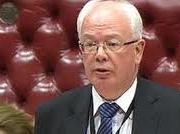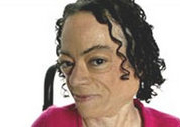Government blocks attempt to fetter DPP

Last night the House of Lords discussed assisted suicide.
The one hour dinner debate, in which 30 peers spoke, was focused on the role of the Director of Public Prosecutions in cases of assisted suicide.
The DPP’s current prosecution policy for assisted suicide was published in February 2010 following Debbie Purdy’s successful appeal to the Law Lords for clarity on which cases of assisted suicide are likely to lead to a prosecution.
Purdy, who has multiple sclerosis, had sought to achieve an assurance that her husband would not be prosecuted should he accompany her to the Dignitas facility in Switzerland to end her life.
The pro-euthanasia lobby had hoped that this case would lead to an increase in the number of assisted suicides in Britain but actually since the policy was put in place the numbers have remained constant at about 20 per year. All that has changed is that more cases are now referred to the DPP!
In all, about 180 Britons have gone to Switzerland to end their lives, but whilst only 8 were referred to the DPP in the years 2003 to 2008, there were 50 referred between January 2009 and December 2011.
The debate, which is well worth reading in full, featured all the usual arguments from both sides, but was important for two reasons.
First it revealed the hand of the pro-euthanasia lobby ahead of a more important debate on assisted suicide next month in the House of Commons. Second it told us where the government stands on the issue.
So what does the pro-euthanasia lobby actually want?
Baroness Jay, a vice-chair of the All Party Group on Choice at the End of Life (aka the parliamentary wing of ‘Dignity in Dying’, the former ‘Voluntary Euthanasia Society’), laid out her agenda.
1.Negotiated immunity from prosecution for people intending to assist a suicide before the act has actually been committed (currently the assessment is made after the act)
2.More scope for doctors and nurses to help someone commit suicide (currently they are likely to be prosecuted under the DPP’s policy)
And how did the government respond?
Lord Wallace (pictured), replying on behalf of the government gave both these suggestions short shrift. He also very helpfully explained the respective roles of parliament and the DPP more clearly.
Lord Wallace said that we need to understand the distinction between the law on assisted suicide (which is set by parliament and is always subject to a conscience vote) and the DPP prosecution policy (which is set by the DPP within the general framework set by parliament).
The DPP is superintended by the Attorney General and through him is accountable to parliament but for parliament to alter the DPP’s guidelines would be to interfere inappropriately with his role.
‘There is a distinction, however, between that accountability (through the Attorney General), which is quite proper, and having guidelines and policies approved by Parliament that in some respects could fetter the independence of the decision of the prosecutor.’
It was never the intention that every case of assisted suicide would lead to a prosecution. Instead the role of the law is to act as a strong deterrent whilst the prosecution policy allows the DPP to show compassion on a case by case basis.
Lord Wallace explained that suspected cases need first to be investigated by the police and then referred to the DPP who would then decide whether there was enough evidence to bring a prosecution and whether it was in the public interest to proceed with one.
With regard to would-be assisters being granted immunity from prosecution by the DPP ahead of time, he said that this was beyond the DPP’s scope of authority.
‘Prospective immunity has never been granted. The DPP told (Lord Falconer’s) commission that,
“the position of the prosecutors has been historically that we won’t indicate in advance whether conduct is criminal or not. Various rulings of the courts have indicated that that would be a wrong position for the prosecutor to adopt and therefore we haven’t done that”.
Indeed, it goes beyond the DPP’s power because the police are responsible for deciding when an investigation should be instigated. Obviously, if there was no alleged crime, that would not be possible.’
With regard to a person ‘acting in his or her capacity as a medical doctor’ to assist a suicide, the DPP guidelines make clear that such a person is more likely to face prosecution.
To confer ‘blanket immunity’ on such people ‘would be wrong’ because this ‘would not only fetter the discretion of the Director of Public Prosecutions who needs to look at the individual circumstances of every case but would be tantamount to a change in the law’ which ‘is for Parliament to determine’.
As for ‘families and doctors discussing end-of-life options’, he said that this was ‘a matter which would more appropriately require a change in the law rather than indicating, ahead of a potential crime being committed, that there was immunity for it’.
So in summary Lord Wallace made it very clear that the government intends to let the DPP get on with his job without interfering. It is not for parliament to decide on a case by case basis who should be prosecuted or to usurp his role by amending his prosecution policy.
There was no vote at this debate, but it has set the groundwork for a further debate in the House of Commons next month, when there will be a vote. However, it is pretty clear that if the pro-euthanasia lobby wishes to get immunity for people assisting suicides ahead of time, or involve doctors as assisters without the fear of prosecution they are not going to do it by trying to get parliament to dictate to the DPP what he should and should not do. That would be to usurp his role.
If they want a change in the law they will have to change the law itself and not try to interfere with the DPP’s prosecution policy which is his responsibility, and not parliament’s, to set and administer.












Leave a Reply
Want to join the discussion?Feel free to contribute!